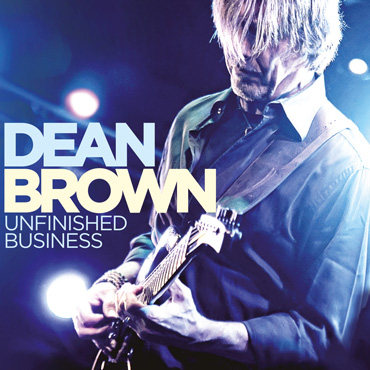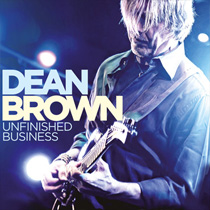Their intuitive sense of simpatico blends nicely on this highly interactive session with bassists Hadrien Feraud, Jimmy Earl, Schuyler Deale and Rene Camacho, Hammond B-3 organist Bobby Sparks, percussionist Joey DeLeon, trumpeter Lee Thornburg, vibraphonist Bernard Maseli and tenor saxophonists Doug Webb and Kirk Whalum. Santana drummer Dennis Chambers, who played on Brown’s powerhouse trio recording from 2009, appears on one track.
Brown stretches with heroic abandon on this collection of old and new tunes from his catalog, showing the remarkable versatility, ingenuity and go-for-it intensity that has marked his 30-year career as a guitarist-composer-arranger and educator. An in-demand figure on the global fusion and contemporary jazz scene, Brown has toured and recorded with such luminaries as Marcus Miller, The Brecker Brothers, Billy Cobham, David Sanborn, Bob James, George Duke, Roberta Flack, Lenny White, Joe Zawinul and Steve Smith’s Vital Information, but takes the greatest pleasure in his own personal projects. The aptly-titled Unfinished Business, which includes some previously unrecorded tunes originally written by the guitarist during the mid ’80s, follows his acclaimed solo outings Here (2001), Groove Warrior (2004) and DBIII: Live at the Cotton Club Tokyo (2009), the latter a stripped-down power trio outing with bassist Will Lee and drummer Dennis Chambers.
„The title of this album is multi-faceted for me,“ says Brown. „There’s the idea of being a musician in general is kind of a work in progress and tends to involve ‚unfinished business‘ in terms of always paying dues, always learning and hopefully always growing as an artist. There is also the idea that there are tunes laying around that don’t make the CDs, for whatever reason. I’ve written way more music than I have records for, so there’s always more tunes. Some of these tunes on Unfinished Business are ones that didn’t make it on previous albums, so I decided to record them now. I’ve been playing them live and people have been telling me, ‚Man, you should put that tune on a record.‘ So I finally got around to doing it here.“
One such tune was the Afro-Caribbean groover „Recon,“ which includes intricate horn arrangements by Brown and a whirlwind drum solo from Smitty. „That was one of the tunes I wrote for the group Primo in the mid ’80s that was never recorded. I just re-arranged it here for a larger ensemble with horns,“ he says. „I’ve played it as a trio too. I learned that if a tune is quality, if it has some meat to it, then you can treat it a lot of different ways.“ This high-energy Latin-tinged number has Brown unleashing some of his most aggressive speed licks of the session.
The opening track to Unfinished Business is Smitty’s ambitious „Uncle Ray,“ which segues from an opening anthemic flourish to a soulful R&B flavored groove. The drumming great, a former longtime member, along with Etkins, of The Tonight Show house band, unleashes with his signature ‚fills of doom‘ on this hard-hitting opener. Brown offers some sweet-toned soloing here that shifts from soulful to positively „Layla“-esque. „That was a tune that Smitty wrote as a kind of Tony Williams inspired rock tune, and it’s based loosely on some block minor chord changes he heard the great pianist Ray Bryant play in the studio one day. Smitty just heard it and he’s got a photographic memory and perfect pitch, so that tune just came out of that. And I decided to put a Southern rock thing on it. The chords are actually kind of tricky, so it was a great challenge. But it came out great.“ The venerable jazz pianist Bryant is the uncle of guitarist Kevin Eubanks, who was the leader and musical director of The Tonight Showband during Smitty’s long tenure there. Hence, the title „Uncle Ray.“
„Just Do It“ is Brown’s blues-drenched, funk-laden number that carries the vocal refrain: „We don’t have to talk about it!“ As the guitarist explains, „Everybody who knows me knows I’m a big fan of Donny Hathaway. And that the bass line here is certainly very reminiscent of Donny’s tune, ‚The Ghetto.‘ So I’m copping to that. But it’s a great little vehicle for me to do this little two-part funk thing, and the tune’s fun. We use it for an encore and make the audience work a little bit at the end.“ Brown takes his time in crafting a brilliant solo here, building from subdued funk to a blazing crescendo of single-note abandon.
„Two Numbers,“ co-written by Brown and Etkins, shifts nimbly from balladic waltz to 12/8 groove. „You can look at it as 12/8,“ says Brown, „but the two numbers that the title refers to are actually just three and four. The thing about three and four together…they’re 12, they’re six, they’re two, they’re all of those at the same time. So those two numbers tend to have a lot of options rhythmically. And I think we pretty much wear out the possibilities on that tune. And the thing I especially like about the tune is that it’s a large form, even though there’s a lot of improvised material. There’s a fair amount of improvising throughout this album, actually. Typically my records have not had that much extended solo stuff as this record does. So I guess this record is the closest thing that I’ve ever done to a ‚jazz record.'“ Brown’s solo here features some of his most lyrical and harmonically adventurous playing of the session.
Smitty’s „Show Me“ is a chugging, big back beat number that serves as a vehicle for Bobby Sparks‘ nasty B-3 work and Brown’s blues-drenched guitar licks. With a slightly dirty tone and a penchant for fleet-fingered, string-bending crescendos, Brown stirs up some scintillating six-string work on this earthy offering. „I used a thicker, fatter sound on that,“ says Dean. „I’m pretty comfortable with the idea of that sort of approach to blues guitar, where it’s somewhere between B.B. King and Eric Gale. That’s kind of where I lean when I’m leaning that way. B.B. is instantly identifiable because of his phrasing, and Eric Gale just sounds great over everything. He figured out a way to not play too much over intricate chords, to keep the sort of honesty and his integrity of who he is no matter what kind of music he played. He was one of those guys who would sound good on literally anything. His style works with anything because it’s very trans-genre. And I kind of take that as something to shoot for in my own playing…just making sure that I’m always staying true to how I feel in the moment and what I’m good at.“
The other Brown-Etkins number, „Santo Para Mim,“ is a soothing samba that has Brown playing some tasty acoustic steel string guitar, alternately comping with fingerstyle chords and running glistening single note lines as percussionist Joey DeLeon’s surdo drum underscores the buoyant proceedings. Etkins also turns in a lyrical piano solo and French phenom Hadrien Feraud delivers a remarkably fluid, uncannily melodic bass solo on this breezy samba groover.
Brown’s foreboding „Headless Horseman“ features some of the most audacious stretching on the album by the guitarist. While his opening wah-wah scratching may be reminiscent of Jimi Hendrix’s opening refrain from „Voodoo Child (Slight Return),“ Dean’s spacious improvisations and soaring solos are more inspired by the darkly menacing vibe that Marcus Miller surrounded Miles Davis with during the early ’80s. Feraud sets an ominous tone with his deep-grooving bass anchor while Brown explores the full range of his fretboard with freewheeling authority. „That might be one of my favorite tracks on the record,“ says Brown of the explosive ‚Headless Horseman.‘.“It’s essentially a group improvisation and they just completely captured the idea of what I was trying to get at, which was I wanted to scare the daylights out of people. But not in a chops way, more of a movie kind of way. I wanted to convey this sense of hopelessness, like, ‚This is gonna happen and there’s nothing you can do about it.‘ And they really embraced that.“
„Hail to the King“ is Dean’s straight-up tribute to the late, great blues guitar icon Albert King. Special guest Dennis Chambers provides the big-as-a-house backbeats while Sparks, Brown’s former bandmate in Marcus Miller’s group, layers on a thick B-3 cushion as the guitarist goes for the jugular with his urgent string bending prowess. Kirk Whalum, who played alongside Brown in Bob James‘ band during the mid ’80s, adds an earthy tenor sax solo here to take the proceedings up a notch. And Sparks contributes a rather twisted Mini-Moog solo here that gives this blues a bit of an edge. „We actually recorded that really fast at a soundcheck during one of the DBIII tours that I did with Dennis and Bobby a couple of years ago. I got Kirk and Hadrien to play over it and it sounded great.“
The collection closes on a decidedly jazzy note with the minor swing number „Whole Tone Blues,“ which has Brown summoning up Wes Montgomery-styled octaves on the head before resorting to deliberate, Kenny Burrell styled single note lines over Rene Camacho’s walking basslines and Smitty’s swinging pulse. Camacho’s deep-toned ‚baby bass‘ solo here is also strictly tied to the low-end tradition personified by the likes of Jimmy Blanton, Larry Gales and Ron Carter. „That tune for me was just an opportunity to get to play some swing with Smitty, who is fantastic and is obviously very deep in that area. Rene Camacho also played his tail off on his acoustic-electric baby bass. I’ve always had a pet hobby of writing blues tunes, and I think I gleaned some of that from listening to John Coltrane, who composed so many great blues tunes. It’s such a concise form that you have to make a statement with, so it becomes an interesting kind of challenge. The title comes from the fact that all the bass notes of the chords are derived from the whole tone scale. And while none of those bass notes are in A, the tune is in A minor.“
Brown is particularly pleased with the nature of the recording during these Unfinished Business sessions. „All these tunes were recorded live in the studio,“ he says, „so there’s a lot of interaction and not a lot of overdubs. I’m trying to protect that kind of stuff. I just like the integrity of the idea that all the vertical stuff happens at once. I love that live feeling.“ That kind of immediacy is felt on all nine tracks from Unfinished Business, which stands as Brown’s most ambitious release to date.








